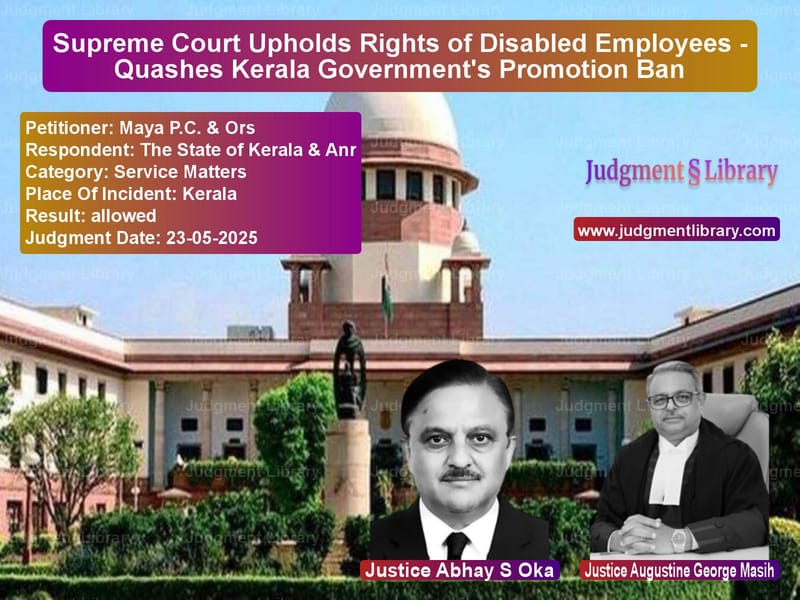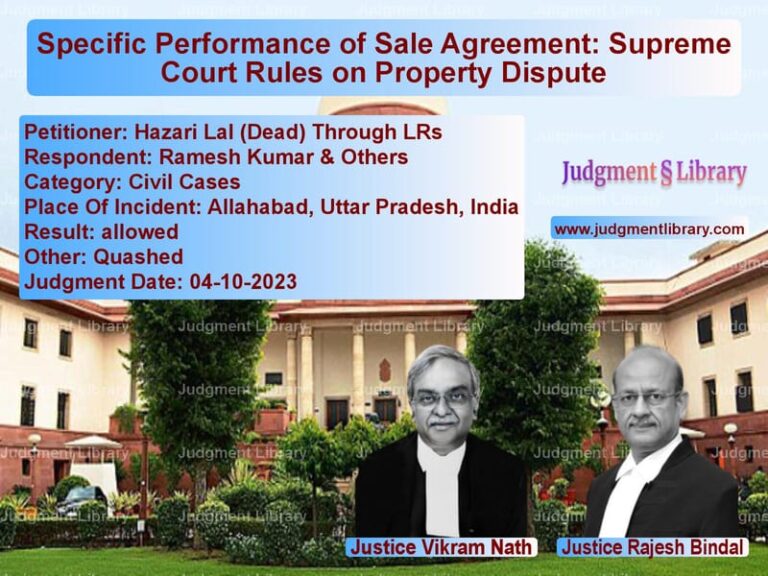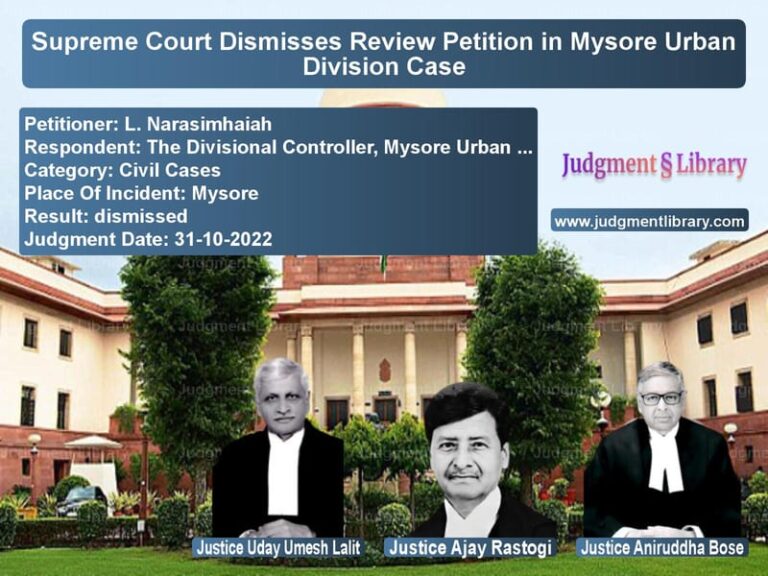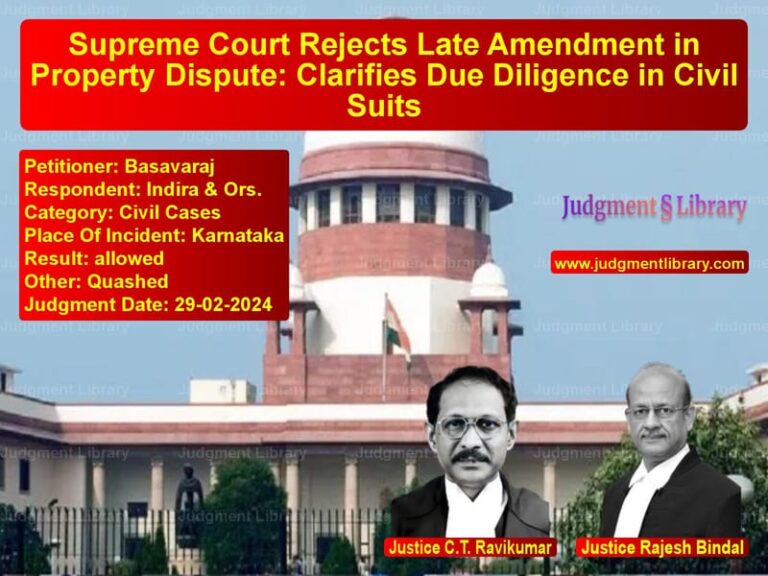Supreme Court Upholds Rights of Disabled Employees – Quashes Kerala Government’s Promotion Ban
In a landmark judgment that reinforces the constitutional rights of persons with disabilities, the Supreme Court of India has delivered a powerful verdict protecting the service benefits of 2,677 physically disabled employees in Kerala. The case represents a significant victory for disability rights and establishes important principles about the government’s obligation to honor its commitments to vulnerable sections of society.
The legal battle involved employees with benchmark disabilities exceeding 40% who had been temporarily engaged in various public institutions under Rule 9(a)(i) of the Kerala State and Subordinate Service Rules. These employees had been given hope through a 2013 government order that promised regularisation of their services, only to have their expectations dashed by a subsequent 2016 order that denied them fundamental service benefits like probation declaration, seniority, and promotion opportunities.
The Promise of Regularisation
The story begins with a Government Order dated May 18, 2013, which represented a significant policy decision by the Kerala State Government. The government resolved to regularise the services of 2,677 physically disabled persons who had been temporarily engaged through employment exchange between August 16, 1999, and December 31, 2003. These employees were to be reappointed to supernumerary posts created specifically for their absorption, with the understanding that these posts would be abolished upon the retirement of the incumbents.
The appellants in these cases were among those beneficiaries who took the government at its word. Some of them made life-altering decisions based on this promise. As the Court noted, “appellants Nos. 11 and 12 were earlier holding regular posts as peons in the revenue department and had resigned from their posts to avail themselves of the benefit under the G.O. dated 18th May 2013.” This demonstrated the level of trust these employees placed in the government’s assurance of regular employment.
The Sudden Reversal
After the appellants had been working for more than three years under the regularisation scheme, the Kerala Government issued another Government Order on February 3, 2016, that fundamentally altered their service conditions. This order declared that employees reappointed under the 2013 scheme “shall not be eligible for declaration of probation, inclusion in the combined seniority list, or consideration for promotion.”
The impact was immediate and devastating. Employees who had been included in seniority lists and had their probation declared suddenly found themselves excluded from combined seniority lists and denied promotion opportunities. In one particularly stark case, an employee who had actually been promoted to a higher grade in 2017 had his promotion cancelled in 2018 based on the retrospective application of the 2016 order.
The Legal Battle
The affected employees challenged the 2016 order through various legal avenues. Initially, they found success at the lower judicial levels. The Single Judge of the Kerala High Court, hearing one of the writ petitions, “allowed the writ petition on 13th September 2017 and directed the respondents to grant the petitioners the benefits of seniority, declaration of probation, and promotion.” The Single Judge held that “G.O. dated 3rd February 2016 was contrary to the principles of equality and fair treatment and noted that once the person is appointed to a post, he is entitled to be treated equally on par with his counterparts.”
Read also: https://judgmentlibrary.com/supreme-court-upholds-teachers-appointment-in-caste-category-dispute/
Similarly, the Kerala Administrative Tribunal ruled in favor of other appellants, finding that “the restrictions were discriminatory and contrary to the Rights of Persons with Disabilities Act, 2016.”
However, the Kerala Government appealed these decisions, and the Division Bench of the Kerala High Court reversed the favorable judgments. The Division Bench took the view that “the appellant’s appointment being against a supernumerary post was a policy concession, and therefore, the benefits of promotion and seniority could not be claimed as a matter of right.”
Arguments Before the Supreme Court
Before the Supreme Court, the appellants’ senior counsel made compelling arguments about the injustice of the situation. They pointed out that “neither of the aforesaid G.O. nor the appointment orders issued to the appellants contain any stipulation to the effect that the appellants would be denied promotion or other service benefits, or that they would be compelled to remain in the same post until their retirement.”
The counsel emphasized the legitimate expectations created by the government’s actions, noting that “the appellants were included in the seniority list and, in several cases, probation had also been declared. Thus, the G.O. dated 3rd February 2016, by which the first respondent purported to deny the appellants the benefits of probation, seniority, promotion and transfer, was issued after the appellants had completed more than three years of satisfactory service.”
Perhaps the most powerful argument came from the perspective of disability rights. The appellants’ counsel submitted that “the action of the respondents is completely against the mandate of Section 33 of the 2016 Act, which provides for a 3% reservation for the persons with disability. His submission is that denying the benefit of completing probation and promotion would be contrary to the spirit of the 1995 and 2016 Acts.”
The counsel made the crucial point that “what is given by this G.O. dated 18th May 2013 cannot be withdrawn subsequently to the prejudice of the beneficiaries of the G.O. dated 18th May 2013.”
The Kerala Government, represented by its senior counsel, defended its position by arguing that “the objective of the G.O. dated 18th May 2013 was to ensure a reasonable accommodation for persons with disabilities and that no further competition procedures had been applied in favour of the beneficiaries.” They contended that “the benefits conferred under the G.O. dated 18th May 2013 already include salary, increments, pension, leave and other allowances. Extending further service benefits, such as promotion, would set an unfair precedent and disrupt the rights of regularly appointed employees.”
The government’s counsel also argued that “the G.O. dated 18th May 2023 is by way of concession and therefore, as rightly held by Division Bench of the High Court, the appellants cannot claim anything which is not provided in the G.O. dated 18th May 2013 as a matter of right.”
The Supreme Court’s Analysis
The Supreme Court, comprising Justices Abhay S. Oka and Augustine George Masih, conducted a meticulous examination of the government orders and appointment documents. The Court’s analysis of the crucial 2013 Government Order revealed several key aspects:
The Court noted that the G.O. “authorised the creation of supernumerary posts for granting reappointment to about 2677 persons with disability who have completed 179 days of service” and specifically provided that “detailed guidelines regarding the ‘regular appointment’ of the said employees shall be issued later.”
Most importantly, the Court observed that “the intention was to give regular appointments to those persons with disability who were working on temporary posts through the employment exchange… Thus, the intention was to grant permanency to those persons with disability.”
The Court examined the actual appointment orders and found that “the appointment was made on probation for a period of one year within a continuous period of two years, as per the Mahatma Gandhi University Statutes” and that “the employment of the appellants was regular employment on a regular basis, as they were treated as having been appointed on probation.”
The Court also noted significantly that “in case of the appellants in other appeals, the appointment orders do not record that the appellants will not be entitled to the benefits of completion of probation or promotion.”
The Court’s Reasoning and Final Decision
The Supreme Court’s reasoning was grounded in fundamental principles of fairness and constitutional morality. The Court made the powerful observation that “the G.O. dated 18th May, 2013, is to ensure that the persons with disability appointed through the employment exchange in a particular post should be regularly appointed. Therefore, all of them were appointed on probation. Now, by the subsequent G.O. dated 3rd February 2016, what is conferred on the appellants by the G.O. dated 18th May 2013 cannot be withdrawn.”
The Court emphasized the detrimental reliance by the employees, noting that “many appellants based on the G.O. dated 18th May 2013 changed their position and opted for other employment for securing the benefits under the G.O.”
In a clear and unequivocal finding, the Court declared that “the G.O. dated 3rd February 2016 is discriminatory and irrational and therefore, violative of Article 14 of the Constitution of India.”
The Court consequently passed the following order: “i) We set aside the impugned judgments of the Division Bench of the Kerala High Court; ii) We restore the judgments of the learned Single Judge of the Kerala High Court and the judgments of the Kerala Administrative Tribunal, which were set aside by the impugned judgments of the Division Bench; iii) The appeals are accordingly allowed.”
Broader Implications
This judgment has significant implications beyond the immediate relief to the 2,677 disabled employees. It reinforces several important legal principles that protect vulnerable sections of society from arbitrary state action.
First, the judgment establishes that once the government makes a commitment to regularise employees, particularly those from disadvantaged backgrounds, it cannot subsequently withdraw fundamental service benefits that are inherent to regular employment. The concept of ‘regular appointment’ necessarily includes benefits like probation declaration, seniority, and promotion opportunities.
Second, the decision underscores that policies benefiting persons with disabilities should be interpreted liberally to advance their rights rather than restrict them. The Court rejected the argument that these appointments were mere ‘concessions’ that could be limited at the government’s discretion.
Third, the judgment highlights the importance of protecting legitimate expectations. When employees make significant life decisions based on government promises—such as resigning from existing jobs—the government must honor those commitments.
Finally, the decision serves as a reminder that the Rights of Persons with Disabilities Act, 2016, represents a significant shift in India’s approach to disability rights, moving from charity-based approaches to rights-based entitlements. The Court’s interpretation aligns with this transformative vision.
The Supreme Court’s verdict represents not just a legal victory for the specific appellants but a reaffirmation of constitutional values that protect the dignity and rights of persons with disabilities in the workplace. It sends a clear message that the state cannot create expectations through beneficial schemes and then arbitrarily withdraw the benefits that make those schemes meaningful.
Petitioner Name: Maya P.C. & Ors.Respondent Name: The State of Kerala & Anr.Judgment By: Justice Abhay S Oka, Justice Augustine George Masih.Place Of Incident: Kerala.Judgment Date: 23-05-2025.Result: allowed.
Don’t miss out on the full details! Download the complete judgment in PDF format below and gain valuable insights instantly!
Download Judgment: maya-p.c.-&-ors-vs-the-state-of-kerala-supreme-court-of-india-judgment-dated-23-05-2025.pdf
Directly Download Judgment: Directly download this Judgment
See all petitions in Employment Disputes
See all petitions in Promotion Cases
See all petitions in Public Sector Employees
See all petitions in Contractual Employment
See all petitions in Recruitment Policies
See all petitions in Judgment by Abhay S. Oka
See all petitions in Judgment by Augustine George Masih
See all petitions in allowed
See all petitions in supreme court of India judgments May 2025
See all petitions in 2025 judgments
See all posts in Service Matters Category
See all allowed petitions in Service Matters Category
See all Dismissed petitions in Service Matters Category
See all partially allowed petitions in Service Matters Category







